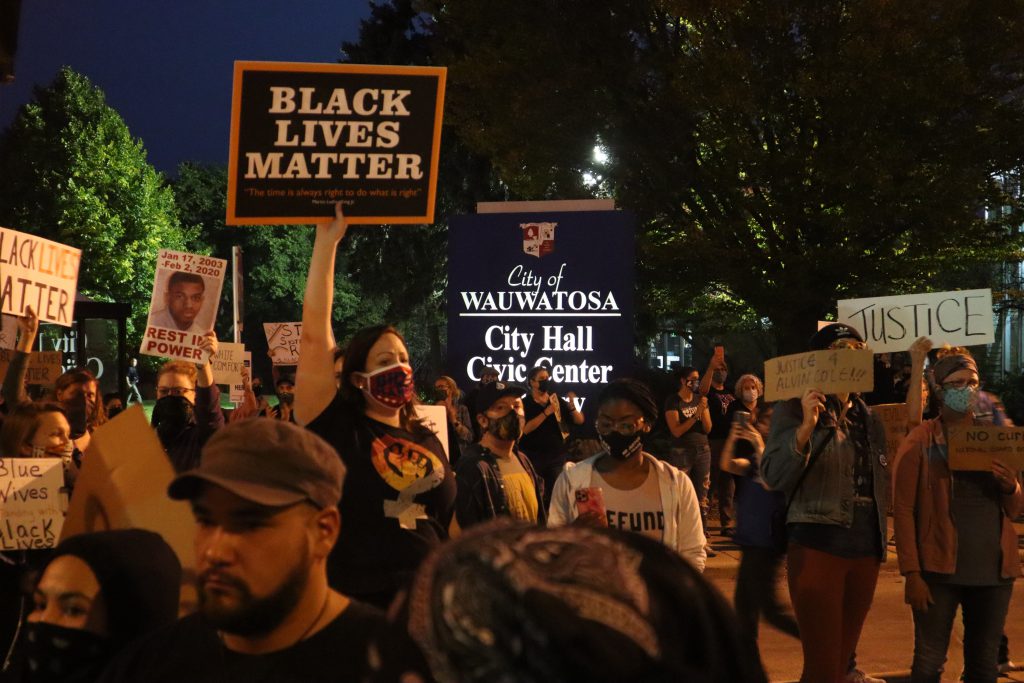Tosa Mayor, Police Union At Odds
City officials at odds with union amid search for new police chief, calls for reforms.
The Wauwatosa Police Department (WPD) will soon have a new chief, but conflicts and questions remain over the department’s culture and direction. Although Chief Barry Weber officially retires on June 1, and the Police and Fire Commission (PFC) is set to discuss finalists for a new chief later in that month, the police union, the Wauwatosa Peace Officers Association (WPOA), hasn’t stopped taking an adversarial approach to the city’s elected officials.
Mayor Dennis McBride told Wisconsin Examiner, “The WPOA has no role in the process of selecting a new chief.” He added that, “the Wauwatosa Police & Fire Commission has total authority over the hiring of police and fire chiefs. The PFC has welcomed a considerable amount of citizen input into the selection process. The PFC members are taking their job seriously. I’m confident that they will select a good chief.” WPD spokesperson Sgt. Abby Pavlik also confirmed that, “To the best of my knowledge, the WPOA (nor its president) does not have input into the process of choosing the next chief.”
McBride noted that an internal investigation into his identification as a target for WPD had been completed by the department. He stressed the investigation’s findings that a single SOG detective, Joseph Lewandowski, was found to have been responsible.
“It was one detective who had a gripe,” said McBride before adding that, “the police union is a problem. They feel that all of the elected officials in Wauwatosa weren’t significantly supportive of the police in 2020. Nothing could be further from the truth but, you know, we had the Mensah issue to deal with and he had to respond to that. So one disgruntled detective, because of that, was listening too much to the police union, drinking too much of that Kool-Aid, and created this slide.”
Although McBride echoed the findings that Lewandowski was told to remove the slide, the investigation had many inconsistencies. WPOA President John Milotzky, who’s also a detective and who had been involved in protest investigations, accompanied Lewandowski when he was interviewed by supervisors for the internal investigation. The investigation acknowledged an overlap between McBride’s placement on a target list and the WPOA’s issues with the city administration.
Milotzky’s signature was also on the letter blasting the mayor’s WTMJ interview. “We demand an explanation — and a public apology — for your blatant insult to our organization, its membership, and the officers of the Wauwatosa Police Department that you made,” the letter stated. It made clear the WPOA’s resentment of McBride’s statements regarding the union’s role in the higher value target issue, and noted that the department’s morale is low. “A recent one-sentence retirement speech made by one of our members speaks volumes against your claim, ‘I’d like to thank the mayor, he made it very easy to leave,’” the letter claimed.
Building new department goals and culture
The WPOA also claimed that attempts at police reform in Wauwatosa have “failed to improve public safety.” Milotzky points to increases in robberies, weapon offenses, and auto thefts to support his argument. The year 2020 corresponded with an increase in problems across municipalities from evictions and joblessness, to overdose deaths and crime.
Some reforms achieved in Wauwatosa have been the implementation of body cameras for all officers, a ban on chokeholds and neck restraints and the formation of new civilian commissions. Milotzky and Weber have both made statements attacking these commissions, as well as local elected officials who supported police reforms pushed by protesters during 2020.
Some argue that WPD’s progress shouldn’t be measured in its crime statistics alone. Milwaukee County Supervisor Shawn Rolland feels that a change in chiefs isn’t enough if the department’s goals and culture remain the same. “I think the most important community conversation we can have is, ‘What does success look like for the Wauwatosa Police Department in 2021 and beyond, and how can we credibility track and measure that success?” Rolland told Wisconsin Examiner. “To be honest, I’m much more interested in a discussion about the police department’s future measurable goals than the name of its next chief.”
Although a department may want to “succeed,” Rolland feels that 2020 rendered old definitions of successful policing obsolete. “In early 2020,” he added, “the Tosa Police Department presented its goals [key performance indicators or KPIs] for the year to the city council. There were two KPI’s presented: 1. the amount of time it took to respond to a call and 2. the percentage of crimes that they had cleared relative to other suburbs.”
The supervisor argues that in 2021 departments should have “a more robust dashboard of goals than just their response time and cases solved.” Rather, Rolland suggests, “Police departments and Fire & Police Commissions could also be measuring and setting goals related to community trust, reducing complaints, tracking and reducing racist 911 calls and more.”
Meeting the new chief candidates
Wauwatosa’s PFC provided the public with a multi-question survey to collect input on the qualities wanted in a new chief. In February, McBride expressed hopes that the new chief will be “of vision and talent, who is a good communicator, works well with elected officials, is conversant with the latest policing standards and initiatives and understands that the WPD serves both Wauwatosa and the broader Milwaukee community, which are becoming more diverse.”
Ahead of the forum the candidates’ names will be released, and another forum is tentatively scheduled for June 14. Interviews will be livestreamed on the city website. “Transparency and public engagement in the process are very important to us,” said PFC President Dominic Leone, who served under Weber for decades before retiring as a lieutenant. “We encourage you to submit your questions and view the final candidates’ interviews.”
Rolland hopes that new leadership at WPD will be receptive to re-focusing the department’s goals. “If our police leadership worked with the community to set realistic, measurable annual goals to build trust, and they were held accountable for reaching them, I have no doubt that they would be successful.” He said. “This is how we move from protesting to policy to systemic change. If we believe this is a systemic issue, then we have to change the system itself.”
Reprinted with permission of Wisconsin Examiner.























The WPD and its union are racist to the core.